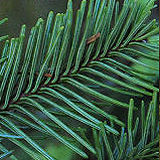
Needles: Bent like hockey sticks
Cones: Upright at tree top, whiskery bracts
Bark: Gray-brown becoming furrowed
Where: Above 2000 feet
These conifers grow above 2000 feet elevation in northwest Oregon and western Washington. All of the low-elevation conifers except Sitka Spruce also grow at higher elevations.
 |
Needles: Bent like hockey sticks Cones: Upright at tree top, whiskery bracts Bark: Gray-brown becoming furrowed Where: Above 2000 feet |
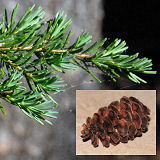 |
Needles: Short, flat, spread in all directions Cones: Rounded scales Bark: Small deep furrows, gray Where: Above 4000 feet Has drooping top. |
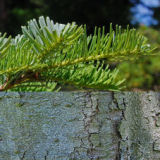 |
Needles: Point up & forward, white lines below Cones: Upright at treetop Bark: Large, gray, scaly plates Where: Above 3000 feet |
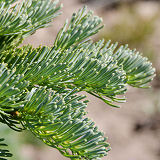 |
Needles: Curved upward, white lines above & below Cones: Upright at tree top, purple Bark: Smooth, gray Where: Above 4000 feet |
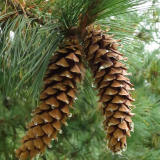 |
Needles: Bundles of 5 Cones: Banana shape and size Bark: Dark gray, scaly plates Where: 3000-5000 feet |
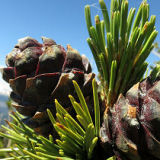 |
Needles: Bundles of 5 Cones: Egg shape and size Bark: Light gray, scaly Where: At the timberline |
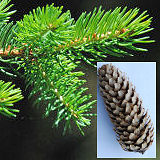 |
Needles: All around twig, sharp points Cones: Douglas fir size with paper-thin scales Bark: Gray, scaly Where: Cascades and Mts. to the east, 3000-6000 feet |
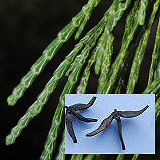 |
Leaves: Long, flat scales Cones: Shaped like a duck's bill Bark: Brown, deep furrows Where: Dry areas of Cascades |
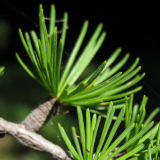 |
Needles: Bundles of 25 Cones: Rounded scales, whiskers Bark Flaky scales, furrowed Where: East of the Cascade crest, up to 6000 feet Similar tree: Alpine Larch |
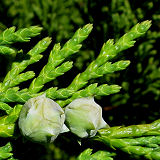 |
Leaves: Short, scaled with flaring tips Cones: Round Bark: Gray-brown, shreddy strips Where: Above 3000 feet |
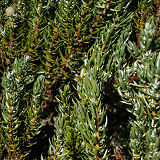 |
Needles: Awl shaped Cones: Berry-like, blue Bark: Brown Where: Alpine areas growing as a low, spreading shrub |
© 2012 Ken Denniston